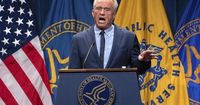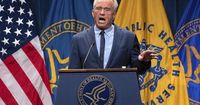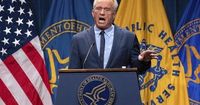On June 9, 2025, Health Secretary Robert F. Kennedy Jr. made a sweeping and controversial move by removing all 17 members of the Advisory Committee on Immunization Practices (ACIP), the key scientific panel that advises the Centers for Disease Control and Prevention (CDC) on vaccine use. Kennedy pledged to replace the entire committee with his own appointees, a decision that has ignited fierce criticism from major physicians, public health groups, and even some politicians.
The ACIP has long been regarded as a nonpartisan, trusted source of science- and data-driven vaccine recommendations. However, the entire current roster of committee members were appointees from the Biden administration. Kennedy, who was once a leading anti-vaccine activist before becoming the nation’s top health official, justified the mass ouster in a Wall Street Journal opinion piece, arguing that “a clean sweep is needed to re-establish public confidence in vaccine science.” He further claimed that without removing the current members, the Trump administration would not have been able to appoint a majority of new members until 2028.
Despite this rationale, Kennedy has not yet disclosed who will fill the vacancies but stated that the new panel would convene in just two weeks in Atlanta, around June 23, 2025. The abruptness of the decision was underscored by the panel members themselves. Noel Brewer, a behavioral scientist at the University of North Carolina who joined the committee in summer 2024, revealed that he and his colleagues received an email late Monday afternoon terminating their services without explanation. Brewer expressed surprise, saying, “I’d assumed I’d continue serving on the committee for my full term.”
Brewer’s research focuses on why people get vaccinated and ways to improve vaccination coverage. He noted that ACIP recommendations were previously considered the “gold standard” for insurers, healthcare providers, and the public. “Whether people get vaccinated is largely influenced by what their doctors recommend, and doctors have been following ACIP guidance,” he explained. He also highlighted that Kennedy had already taken the unusual step of changing COVID-19 vaccine recommendations without consulting the committee, a move that drew criticism from doctors’ groups and public health advocates. Brewer added, “It’s unclear what the future holds. Certainly provider organizations have already started to turn away from ACIP.”
Kennedy justified his drastic action by accusing the committee members of having too many conflicts of interest. Yet, current rules require ACIP members to declare any potential conflicts and business interests at the start of each public meeting, and they must disclose any such conflicts that arise during their tenure. This claim of conflicts of interest was challenged by Dr. Tom Frieden, president and CEO of Resolve to Save Lives and former CDC director, who called Kennedy’s move “a dangerous and unprecedented action that makes our families less safe” by potentially reducing vaccine access for millions.
“Make no mistake: Politicizing the ACIP as Secretary Kennedy is doing will undermine public trust under the guise of improving it,” Frieden said in a statement. “We’ll look back at this as a grave mistake that sacrificed decades of scientific rigor, undermined public trust, and opened the door for fringe theories rather than facts.”
Dr. Georges Benjamin, executive director of the American Public Health Association, described the mass ouster as “a coup.” He told The Associated Press, “It’s not how democracies work. It’s not good for the health of the nation.” Benjamin also voiced concerns about whether future committee members would be viewed as impartial, accusing Kennedy of breaking a promise not to take such an action. “He said he wasn’t going to do this,” Benjamin said, adding that the public health association plans to monitor Kennedy’s moves “like a hawk.”
Dr. Bruce A. Scott, president of the American Medical Association, also weighed in, underscoring the ACIP’s role as a trusted source of vaccine guidance. “Today’s action to remove the 17 sitting members of ACIP undermines that trust and upends a transparent process that has saved countless lives,” Scott said in a statement. He warned that Kennedy’s move, combined with declining vaccination rates across the country, could lead to an increase in vaccine-preventable diseases.
Republican Senator Bill Cassidy of Louisiana, a physician who had expressed reservations about Kennedy’s nomination but ultimately voted to confirm him as health secretary, spoke with Kennedy shortly after the announcement. Cassidy shared his apprehensions on social media, stating, “Of course, now the fear is that the ACIP will be filled up with people who know nothing about vaccines except suspicion.” He pledged to continue engaging with Kennedy to ensure that the committee remains composed of qualified experts.
The ACIP had been in a state of flux since Kennedy took office, with its first meeting of 2025 postponed abruptly by the U.S. Department of Health and Human Services in February. During Kennedy’s confirmation hearings, Cassidy sought assurances that the panel’s vaccine recommendations would be preserved, highlighting the importance of maintaining scientific integrity.
Adding to the upheaval, the webpage featuring ACIP members was deleted on the evening of June 9, shortly after Kennedy’s announcement, signaling a complete reset of the committee’s public presence.
The ramifications of Kennedy’s decision are already stirring debate across the medical and public health communities. The ACIP has been central to vaccine policy in the United States for decades, providing guidance that shapes insurance coverage, clinical practices, and public trust. Undermining this institution risks sowing confusion among healthcare providers and the public alike, especially at a time when vaccine skepticism remains a significant challenge.
While Kennedy argues that his purge is necessary to restore confidence in vaccine science, critics warn that the move could erode decades of progress and open the door to misinformation. The coming weeks will be critical as Kennedy’s new appointees take their seats and the committee reconvenes in Atlanta. The nation will be watching closely to see whether this new chapter will reinforce public health or deepen divisions around vaccines.



